Dental implants are a revolutionary solution for healing missing teeth, offering benefits far surpassing traditional methods. This post delves into the essence of dental implants, contrasting the experiences and outcomes of getting a dental implant in Vietnam and Australia. While dental tourism might appear attractive initially, understanding the full scope of what’s at stake is crucial for making an informed decision.
What Are Dental Implants?
Dental implants have revolutionised the dental treatment industry, offering a superior solution for replacing missing teeth. Unlike traditional methods, implants provide a more natural, functional, and long-lasting option. Here’s a deeper look into the nature and benefits of dental implants:
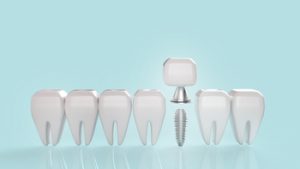
The Structure of Dental Implants
A titanium post is at the heart of a dental implant, chosen for its robustness and biocompatibility with human tissue. This post is surgically added into the jaw bone, acting as an artificial root that securely anchors the replacement tooth. Over time, the titanium post and the bone fuse through a process known as osseointegration, creating a stable foundation for the artificial tooth.
Restoring the Aesthetics and Functionality
The top portion of the dental implant is typically a custom-made crown designed to mimic the look and function of natural teeth. This crown is attached to the titanium post once the osseointegration process is complete, filling the gap left by the missing tooth. The result is a restoration that looks indistinguishable from natural teeth and restores full chewing function and speech clarity, which are often compromised with the loss of teeth.
Benefits of Oral Health
Dental implants play a crucial role in preserving oral health. They prevent the common issues associated with tooth loss, such as the shifting of adjacent teeth and the deterioration of jawbone density. By maintaining the alignment of the remaining teeth and supporting jawbone health, dental implants contribute significantly to the overall structural integrity of the oral cavity.
Versatility of Dental Implants
The adaptability of dental implants makes them a suitable option for a wide range of dental treatment scenarios. Whether it’s a single tooth replacement with a single dental implant, multiple teeth replacement using several implants to support a bridge, or mini dental implants for specific conditions, the flexibility of dental implants allows for tailored solutions that meet individual needs and preferences.
A Comprehensive Solution
Dental implants represent a holistic approach to dental treatment. They improve the aesthetic appearance of one’s smile and offer significant functionality and oral health benefits. Dental implants provide a durable, reliable, and aesthetically pleasing solution for individuals missing one or more teeth, restoring confidence and quality of life.
In conclusion, dental implants are a pivotal advancement in dental treatment, offering aesthetic, functional, and health benefits. They are a testament to the strides made in dental technology, providing patients with the best possible outcomes in tooth replacement therapy.
Dental Implants Procedure
The procedure for dental implants is a meticulously planned and executed process that involves multiple stages, each designed to ensure the long-term success and functionality of the implant. Whether you’re considering a single dental implant or multiple dental implants, understanding the procedure can help demystify the process and set realistic expectations. Here’s a closer look at the dental implant procedures:
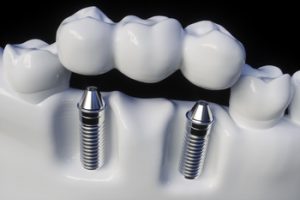
Initial Consultation and Planning
Getting dental implants starts with an initial consultation at a local dental clinic. During this visit, your local dentist will thoroughly examine your oral health, including X-rays or CT scans, to examine the condition of your jawbone and the placement of potential implants.
This step is crucial for planning the treatment, especially if you’re getting multiple dental implants, as it helps determine the optimal locations for implant placement.
Preparation and Bone Grafting
For some patients, especially those who have experienced bone loss in the jaw, a bone graft may be necessary before implant placement. Bone grafting is a procedure where a piece of bone from another part of the body, or a bone grafting material, is used to enhance the density and volume of the jawbone.
This ensures that the jawbone is capable of supporting the dental implants securely. The need for a bone graft and the kind used will depend on the individual’s specific dental work requirements and the condition of their jawbone.
Implant Placement
Once the jawbone is prepared or has healed sufficiently after a bone graft, the next step is placing the titanium dental implant into the jaw. This procedure is performed under local anaesthesia to ensure comfort.
The implant is carefully inserted into a pre-drilled hole in the jawbone. In cases where multiple dental implants are placed, this step may take longer and require more planning to ensure each implant is positioned correctly for optimal function and aesthetics.
Healing and Osseointegration
After the implant has been placed, a healing period, known as osseointegration, begins. This is when the bone tissue grows around the implant, effectively integrating it into the jaw.
This process is critical for the implant’s stability and can take several months. During this time, patients may be fitted with a temporary crown or bridge to heal the gap of the missing teeth.
Attaching the Abutment and Crown
Once osseointegration is complete, the next stage involves attaching an abutment to the implant. The abutment acts as a connection between the dental implant and the replacement tooth (crown).
After the abutment is in place, a custom-made crown that matches the natural teeth’ shape, size, and colour is attached. For those receiving multiple dental implants, this step may involve the placement of individual crowns or a bridge supported by the implants.
Follow-Up and Maintenance
The final step in the dental implant procedures involves follow-up visits to your local dental clinic to ensure the implants function well and the surrounding tissue is healthy.
Proper oral hygiene and regular dental check-ups are essential to the long-term success of dental implants. Your local dentist will guide you on caring for your new implants and natural teeth to maintain oral health.
Advantages of Dental Implants in Australia
Opting for implant dentistry in Australia brings many benefits, setting a global benchmark for excellence in dental implant procedures. Australia’s advantages are unmatched, from the meticulous approach to placing dental implants to the overarching patient care framework. Here’s a refined exploration of why Australia is a premier destination for dental implant procedures:
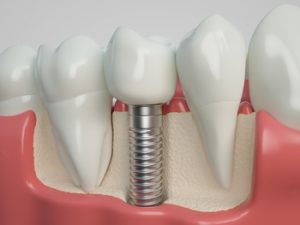
Global Leadership in Implant Dentistry
Australia is recognised worldwide for its leadership in implant dentistry. This reputation is built on rigorous academic training, cutting-edge research, and a commitment to continuous professional development among dental practitioners.
Australian dentists experts in implant dentistry are among the most highly qualified and experienced professionals in the world, ensuring that patients receive care that is not only based on the latest scientific evidence but also tailored to meet their individual needs.
State-of-the-art techniques for Placing Dental Implants
The success of a dental implant procedure hinges significantly on the precision with which the implants are placed. Australian dental clinics utilise state-of-the-art surgical techniques and imaging technologies, such as 3D CT scans, to ensure the accurate placement of dental implants.
This technology allows dentists to assess the quality and density of the jawbone, plan the implant placement with pinpoint accuracy, and execute the procedure with minimal invasiveness. Such precision enhances the likelihood of successful osseointegration, where the implant fuses with the bone, providing a stable foundation for the replacement teeth.
Advanced Materials and Customised Treatment Plans
The materials used in Australian implant dentistry are of the highest quality, often exceeding global standards. Titanium, known for its strength and biocompatibility, is the material of choice for dental implants, ensuring longevity and reducing the risk of rejection.
Furthermore, the prosthetics used with the implants—such as crowns and bridges—are custom-crafted in state-of-the-art labs to replicate the natural appearance of the patient’s teeth, ensuring aesthetic and functional harmony.
Emphasis on Patient Comfort and Safety
Australian dental clinics strongly emphasise patient comfort and safety during the dental implant procedure. Pain management techniques ensure a comfortable experience, and post-operative care focuses on minimising discomfort and facilitating a swift recovery.
The stringent sterilisation protocols and adherence to safety guidelines further mitigate risks, making the process as safe and comfortable as possible for the patient.
Regulatory Excellence and Patient Rights
Australia’s dental industry is regulated by strict guidelines that protect patient rights and ensure the highest standards of care.
These regulations cover all aspects of dental practice, from the qualifications of dental professionals to the safety and efficacy of the dental materials used. Patients can take comfort in knowing they receive care that meets rigorous national standards.
Accessibility and Supportive Care
Accessibility to quality dental care is a hallmark of the Australian healthcare system. Dental clinics nationwide offer dental implant treatments, making it easier for patients to access the care they need. Moreover, supportive post-operative care and clear communication throughout the treatment process ensure that patients are well-informed and comfortable at every step.
Long-term Health Benefits and Cost-Effectiveness
While the upfront cost of dental implants in Australia may be higher than in some other countries, the long-term health benefits and cost-effectiveness of high-quality care are significant.
Dental implants are a long-term investment in oral health, potentially preventing future dental issues related to tooth loss, such as jawbone deterioration and misalignment of remaining teeth. The durability and longevity of Australian dental implants can reduce the need for future dental work, making them a cost-effective solution over time.
Drawbacks of Dental Implants in Vietnam
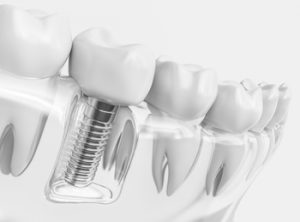
While the allure of lower dental implant costs can be tempting for many, it’s essential to consider the broader implications of receiving dental treatment abroad. This comprehensive analysis will delve into the complexities of dental implants in Vietnam, highlighting key concerns and potential risks.
Variability in Dental Care Standards
One of the most significant drawbacks of seeking dental implants in Vietnam is the inconsistency in healthcare standards. The quality of dental care, including the expertise of dental professionals, the technology available, and the materials used for dental implants, can vary widely between clinics.
This variability poses a risk to patients, as subpar treatment can lead to complications, inferior results, and the need for corrective procedures, which can ultimately increase the total cost and effort required to achieve the desired outcome.
Communication Barriers
Effective communication between the dentist and patient is crucial for the success of any dental treatment, especially for complex procedures like dental implants.
Language barriers can pose significant challenges for international patients in Vietnam, potentially leading to misunderstandings about treatment plans, expectations, and post-operative care instructions. Miscommunications can affect the quality of care received and compromise the overall success of the dental implant procedure.
Post-Treatment Support and Follow-Up
The nature of dental implants requires meticulous post-operative care and regular follow-up visits to ensure successful integration and functionality. Patients who receive dental implants in Vietnam may find it challenging to access adequate post-treatment support once they return home.
The logistical and financial implications of travelling back to Vietnam for follow-ups or addressing complications can negate the initial savings on the cost of dental implants, adding stress and uncertainty to the recovery process.
Quality and Safety Concerns
While many clinics in Vietnam strive to meet international standards, concerns about the quality and safety of dental treatment persist. This includes questions about the sterilisation of equipment, infection control practices, and the quality of dental implant materials.
Compromised safety standards can lead to serious health risks, including infections and implant failures, which jeopardise the patient’s health and entail additional costs for remedial treatment.
Regulatory and Legal Protections
Patients opting for dental implants in Vietnam may face limitations regarding regulatory and legal protections. The regulatory environment governing dental practices in Vietnam may offer a different level of patient recourse and protection than in other countries.
In the event of malpractice or unsatisfactory outcomes, navigating the local legal system for redress can be daunting and may offer little to no recourse for international patients.
Hidden Costs and Financial Implications
The initial lower dental implant cost in Vietnam can be appealing, but it’s crucial to consider the full spectrum of potential hidden costs. These can include expenses related to travel, accommodation, and unforeseen complications requiring additional treatment.
Moreover, suppose the implants need adjustments or corrective procedures upon returning home. In that case, the cumulative financial burden can quickly surpass the cost of undergoing the procedure in a country with higher initial costs but more comprehensive care standards.
Long-Term Implant Success and Maintenance
The long-term success of dental implants heavily relies on the quality of the initial procedure and ongoing maintenance. Concerns arise when dental implants placed in Vietnam require maintenance or encounter issues, as local dentists in the patient’s home country may need more time to rectify or maintain work initiated elsewhere. This can lead to a complex situation where ensuring the longevity and health of the dental implants becomes more complicated and costly.
Cultural and Ethical Considerations
Navigating a foreign country’s cultural and healthcare landscape can present unexpected ethical and practical considerations. The standards for informed consent, patient privacy, and ethical treatment may differ, potentially impacting the patient’s comfort and trust in the healthcare process. Understanding and adjusting to these differences is crucial for international patients but can add a layer of complexity to the decision to undergo dental treatment abroad.
Impact on Local Healthcare Systems
Choosing to undergo dental treatment abroad also raises questions about the broader impact on local healthcare systems. Patients may need to rely on their home country’s healthcare infrastructure for post-operative care or complications, potentially straining resources and diverting attention from local patient needs. While not immediately financial, this indirect cost contributes to the broader implications of seeking dental care outside one’s home country.
Conclusion
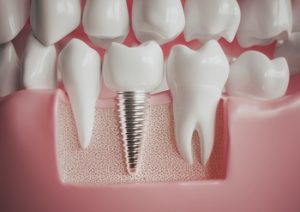
While the allure of dental tourism, such as opting for a dental implant in Vietnam, might be tempting due to perceived cost savings, the advantages of undergoing dental implant surgery in Australia far outweigh the risks associated with overseas dental treatments.
Australian dental care provides peace of mind through high-quality standards, advanced technology, and comprehensive patient care, ensuring the best possible outcomes for those seeking to replace missing teeth with dental implants.
Contacting a local dental clinic in Australia is a wise first step for anyone considering dental implants. Beyond Infinity Dental welcomes your queries about dental implant treatments and is ready to guide you through your journey to a brighter, healthier smile. Don’t compromise on quality and safety for your oral health. Contact Beyond Infinity Dental at (02) 8806 3799 to schedule a consultation and learn more about how we can restore your smile with confidence.
Note: Any surgical or invasive procedure carries risks. Before proceeding, you should seek a second opinion from an appropriately qualified health practitioner.
References:
https://www.colgate.com/en-us/oral-health/threats-to-dental-health/what-is-dental-tourism
https://www.healthline.com/health/dental-and-oral-health/benefits-of-dental-implants










